Dr. Pete shared examples of the marketing funnel, highlighting how we must overcome hurdles (or break through barriers to conversion) in order to make a sale.
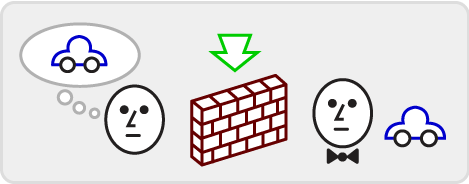
Why People Buy Premium Domain Names
The idea of an exact match domain (EMD) is that you are buying a piece of land right next to the highway. You sink in a lot of money upfront, but hope that it backs out over time by lowering your traffic acquisition costs. For many years this model was both logical and profitable.
At the peak of the domain name bubble recently, the domain name Poker.org sold for a million Dollars.
A domain name is an asset just like a stack of cash, a piece of gold, or a CDO is. But rather than having a fixed universal value, it is only a *relative* store of value that can go up or down based on market conditions. (Many of these other "fixed" stores of value also change in value when measured against other value stores over time, but they typically change value somewhat slowly and due to the acts of the entire market. With domain names, Google can use their dominant search position to drive massive changes in value in a short period of time).
Search Engines Influence the Value of Domain Names
Search is the primary mode of online navigation. For years search has been replacing almost all other forms of online navigation as the new default. There are about 7 billion people in the world with about half of them online. Google likely gets about a search per person every day!
Search engines can decide what variables they want to count & how much. In a world where subjective marketing aspects (like branding) are replacing signals of relevancy the value of keyword domain names is greatly diminished.
If your model works out to where it takes 3 or 4 years to break even & recoup the initial investment, then that model may look quite different if Google manages to redirect 50% or 60% of that traffic stream at some point in time ... at some point the price of the domain has to adjust to the new market conditions.
An Example of the New Normal in Search
With the above in mind, I thought it would be worth highlighting how the domain bubble grew & ultimately popped.
First, lets start with a current search result. The below example is for "pool tables."
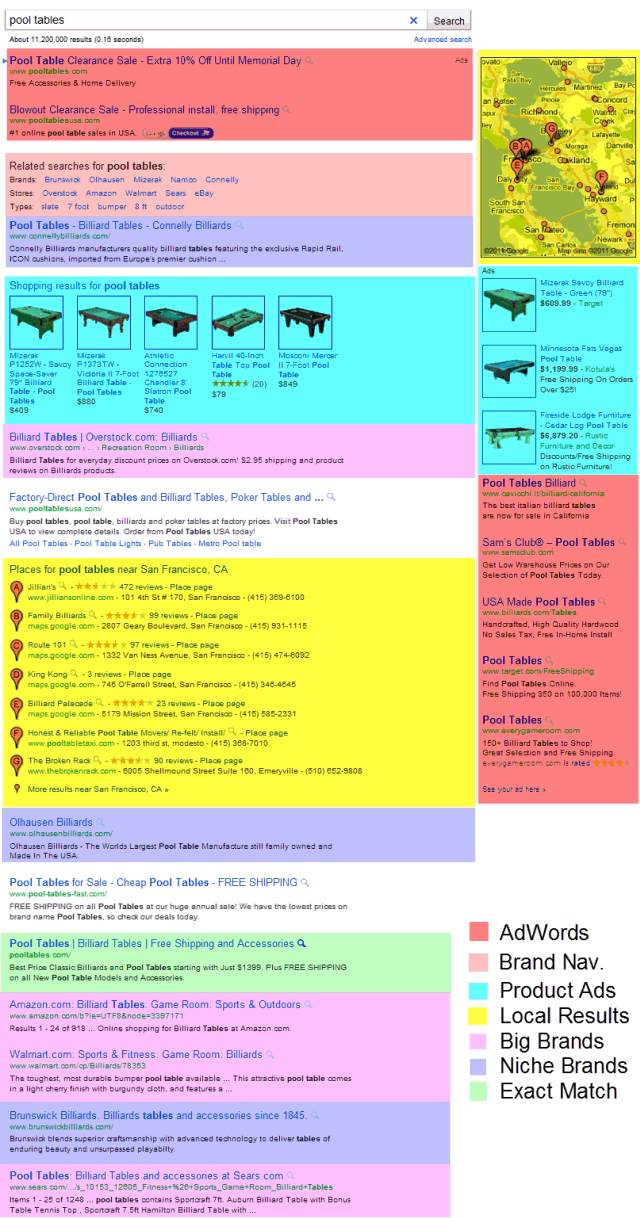
Note that brands get a number of options to play here: AdWords ads, AdWords product ads, Google Product Search, branded navigation, big brands in the organic search results, niche vertical brands, and any local results for nationwide chain brands with a local outlet. Go back a couple years and this search result would have mostly been dominated by smaller online retailers & niche hobbyist websites.
The below image is from 2008. Notice how small the AdWords ads are & how 7 of the 10 organic listings on page 1 have "pool tables" in the domain name.
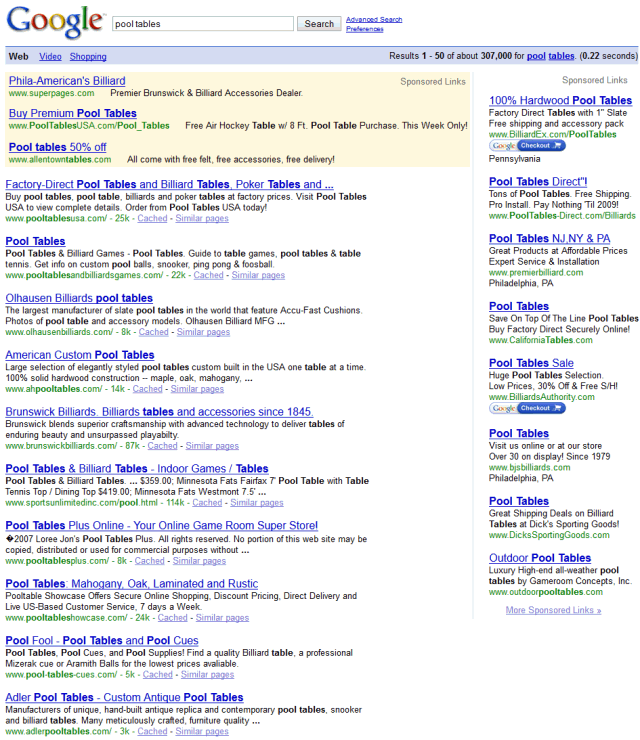
Today most of those results are off onto page 2 or 3 or beyond, where few searchers dare to go. Now even the exact match domain is forced to buy AdWords to compete for it's own name. Without the AdWords ad, the exact match domain would require a searcher to skip over 45 other links before finding it somewhere below the fold.
Other keywords (like engagement rings) which once left room for review & comparison sites have been completely dominated by brands. Outside of end consumer reviews (and who but an expert publicly reviews more than 1 engagement ring? and who is not biased in their review of said rings with emotional attachments?) there is no way to get a comparative view of quality. There is no room for such an idea in Google's brand-only search results.
Update: Checking back in a few years later ... as of August of 2013 this post has only grown more true over time. In the following image, notice how the ads keep on scrolling, the size of the local result insert increased & now even the .com EMD "category killer" isn't even on page 1 of the search results any longer.
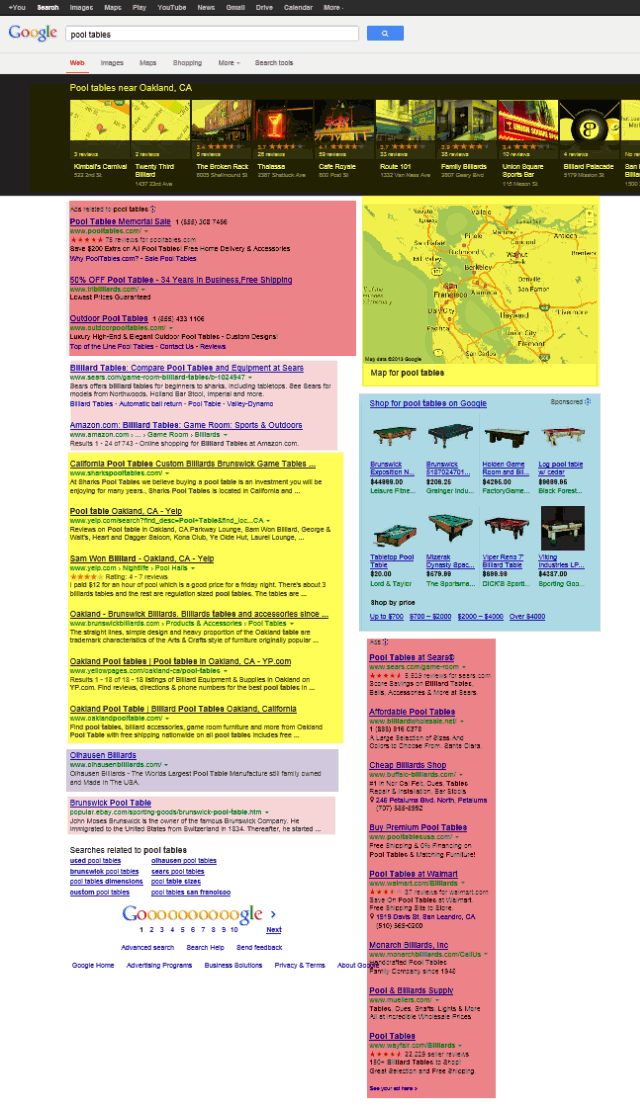
Let's pick apart how we got here...
Google Boosting Rankings of Authoritative Brands
In 2008 Eric Schmidt made the famous quote about how consumers are hardwired for branding. I mentioned how he was signaling the future of the algorithm, but was largely ignored at the time. Since then Google has launched:
The algorithm is only going to keep adding more signals that boost brands. PoolTables.com might have better editorial content than a mega-retailer like Amazon.com, but it is hard for them to collect as many reviews as Amazon can.
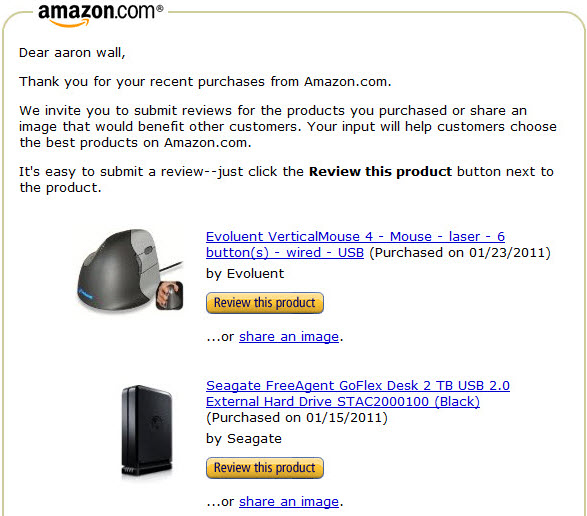
Social Search Brand Boost
Matt Cutts also stated that they like the potential of +1:
Cutts confirmed what Google said when the +1 button launched: Google will use +1 activity to influence its search results.
“It’s definitely a signal we’re paying a lot of attention to,” Cutts said. “It has tons of potential. It looks very promising.”
Big brands can do giveaways to their core customer base to expand into new markets, allowing customers to pay for the discounts with a vote, stuffing the ballot box on these new "relevancy" signals.

Bigger AdWords Ads
Google shifted the top AdWords ads to having a longer headline, which provides roughly a 13% lift in CTR.
In addition, AdWords ads have grown larger due to other ad extensions, like:
- sitelinks
- product extensions
- phone numbers
- maps
- other nascent extensions, like videos
For commercially viable keywords these have the net effect of pushing the organic search results further down the page. A recent study by Optify highlighted that while low CPC & tail keywords send most clicks (~89%) to the organic search results, for high CPC & head keywords AdWords ads consume most search clicks (~ 60%).
Google Comparison Ads
In certain high money verticals Google offers Google Comparison / Google Advisor ads, which allow them to place a 4th ad slot above the organic search results.
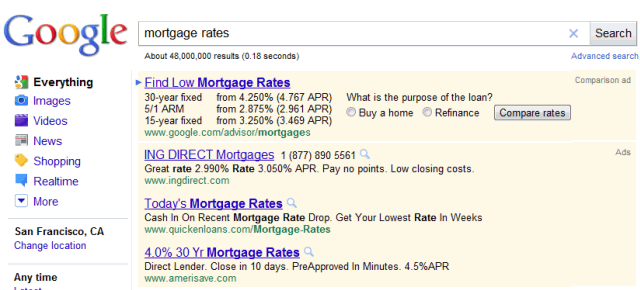
Notice how much larger some of these ads are than typical ad units. When Google targets your keyword with one of these ads they significantly change the dynamics of the market.
Product Ads
Google has offered graphical product ads automatically matched to the search results. Generally for bigger brands Google offers these on a risk-free cost per acquisition pricing, whereas smaller advertisers need to pay by the click to use this ad format.
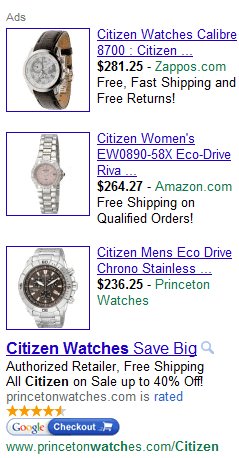
Googler announced that searchers clicked on this ad format nearly twice as often as regular search ads & in some cases Google has even started testing including these ads in their ad space that appears above the organic search results.

Search clicks are a zero sum game, so the more risk-free clicks the big box brands get from this ad format the lest clicks there is to go around for everyone else.
Product Search Listings
These serve as more eye candy to distract searchers from the organic search results. Once again these typically feature listings from larger brands & Google doesn't mind if these are a bit off because they still push the eye away from the organic results and toward the AdWords ads.
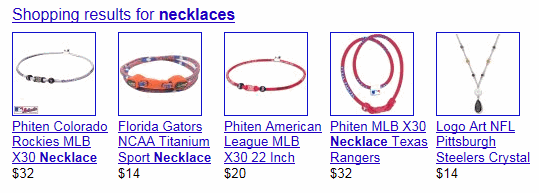
Look how off those "necklaces" are. Evidently if you are not a sport's fan you have no business wearing necklaces ;)
Localization
Localization is a boon for small local businesses which can now gain a slice of the local traffic stream that they were priced out of the market on. However, as a domain buyer, the value of AutoInsurance.com drops significantly after the large metro areas have localized results which do not allow the cost of an expensive domain to be amortized by the potential to rank everywhere. What is worse, is that the largest cities are the ones with the most vibrant economic activities (more businesses, more residents, larger loan sizes, and so on). Through localization any generic unbranded nationwide player simply misses out on the most valuable traffic.
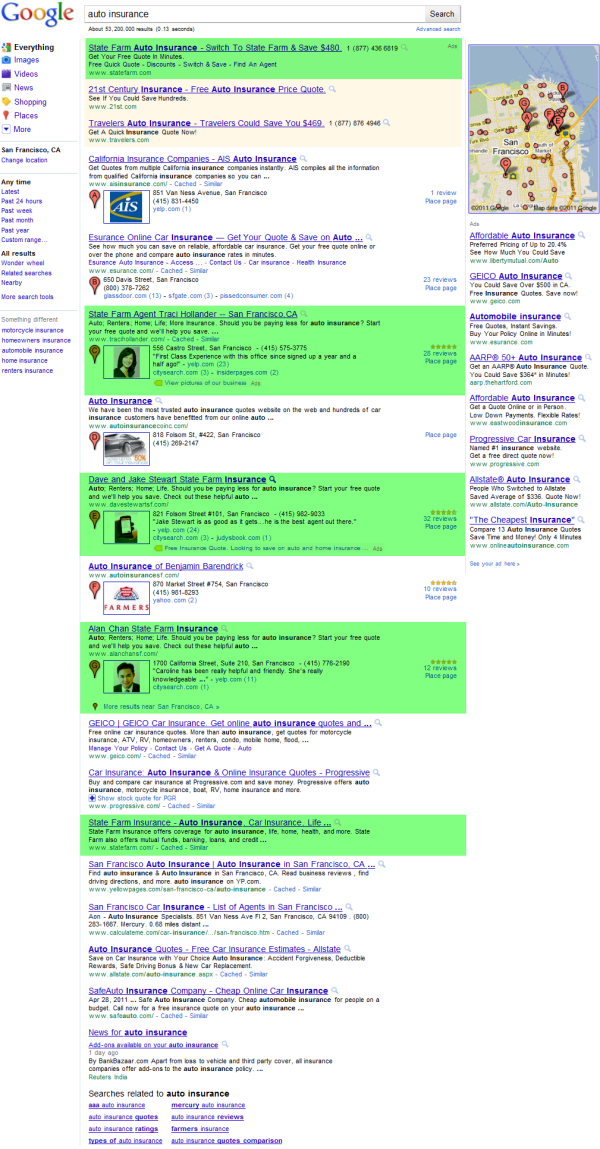
Verticalization & Double Dipping Ads
Much like how localization locks generic players out of local markets, Google's increased verticalization (and allowing certain brands to double or triple dip on ad serving) now means that some results have over 80% of the screen's real estate dominated by a single key player.
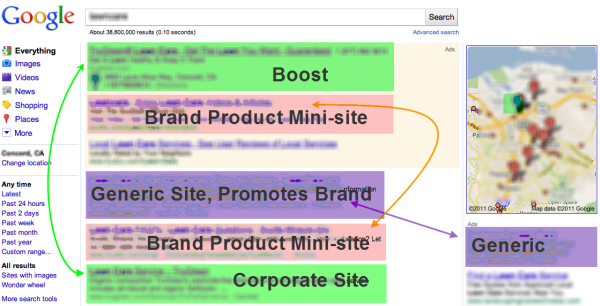
Search Box > Address Bar
When Google Chrome launched it replaced the address bar with a search box.

That allows Google to...
- intercept & redirect type-in traffic demand
- re-highlight content you have already seen in the past (likely to be from some larger brands, as they have larger ad budgets & more ways to be found)
- recommend popular searched-for keywords (which are often brands, since awareness-based advertising creates search demand
When Internet Explorer 9 was launched Microsoft also adopted these features
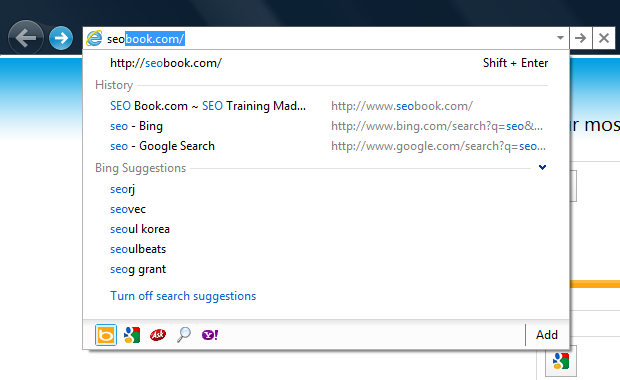
Taking control of the address bar one step further, Google has a beta version of Chrome out where the address bar is not even visible unless you scroll over that part of the page. Firefox also offers a similar beta extension! If this feature goes mainstream it wouldn't be surprising to see Microsoft follow suit.
Google Suggest / Instant
Google Instant's search auto-completion directs users away from some keywords and toward others. At first that statement seems like it could be saying that it consolidates search volume to a smaller set of keywords & thus could make domain names more valuable. However, if you have ever looked at a list of the most popular keywords you would know that they are largely filled with branded keywords. The media was aware of this obvious shift & Amit Singhal had to do an interview stating that there was no brand bias to Google Instant.
Awareness-based advertising biases keyword recommendations, which is why Pontiac ran a TV commercial telling you to search Google for their brand. Of course when SEO consultants did similar things they got whacked. ;)
Extra White Space
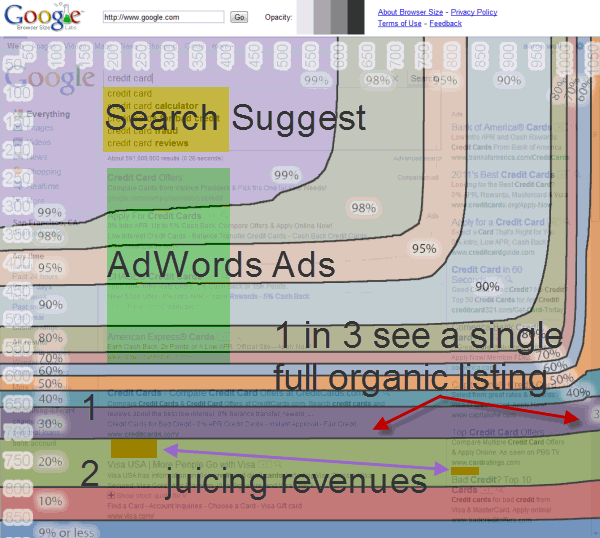
In the most recent beta Google has tamed this down a bit from the absurdity they were first testing, but Google has shown an interest in using whitespace trickery to drive the organic search results further down the page.
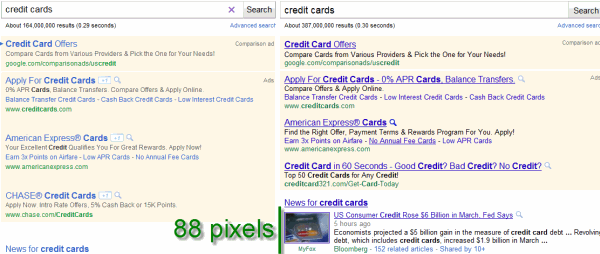
The rise of mobile applications & mobile search devices further pull leverage away from publishers & toward ad networks.
Google Acting as a Publisher & Affiliate
Not only Google, but all the major search engines are beginning to act as publishers & affiliates.
What's worse, is through personalization they have an asymmetrical information advantage over publishers in their ad network. They can tell you that you are getting 68% of the value of an ad click, but how do you know if they don't undervalue the contribution of that click while overvaluing the contribution for clicks where they keep 100% of the income on?
Google Small Business Taxes
Some sites get the benefit of the doubt, whereas other sites just get doubt. I highlighted how Google's approach to link buying, AdWords penalties & other issues vary based on who is getting whacked in our recent post about Google small business taxes.
Too Small to Matter
Smaller sites are more likely to come under attack from "the algorithm" as they are easier to knock over & are generally less stable. That gives them a higher risk factor & makes it even harder to build reliable business processes around it. How do you scale employment (or even inventory) when one month you are up 50% and the next month you are arbitrarily off 60%?
Further, Google has consistently screwed up original source attribution, which makes it even harder to justify for a small business to go the extra mile & spend extra money creating premium content, if the result will be Google paying someone to steal that content & wrap it in AdSense ads.
Where Does this Lead Us?
If you buy a "category killer" it is critical that you rank #1, but in many niches the exact match domains that ranked #1 for nearly a decade are now #3 or #4 in the organic results. Add in 3 AdWords ads above the organic results & things like product ads and it isn't hard to end up below the fold. If your relationship to that 1 keyword is your core competitive strategy but you can't even promote the keyword (because you are below the fold) then the strategy is a failed one.
Further, as Google keeps adding more usage signals into the relevancy mix that will keep favoring brands.
This is not to say domain names are dead across the board. there is still plenty of opportunity in some areas, but equally some names require large investment & as an SEO strategy may get thrown under the bus by any of the above (or similar future moves in other market niches).
I Stopped Buying Domain Names
I believe I was one of the first SEOs to publicly highlight the benefits of exact match domain names. Back when Google engineers were dismissive of it some of the smart money was dismissive of what the engineers stated and made plenty of money from it. But I have prettymuch stopped buying domains at this point...as in most cases the valuations generally don't make sense on a risk adjusted basis in the current market (let alone what the market will look like after the introduction of +1 & other brand signals).
Deep Pocketed SEOs Are Selling Their Domain Names
The person who was likely the single SEO most responsible for running up the price of exact match domain names (he over-paid for some of them based on the presumption that the numbers would back out similarly to some of his earlier investments in a market that was dominated by a government-sponsored bubble) has now become a domain seller.
You don't get much more amoral capitalist opportunistic than this person is (see the following before and after for his payday loans effort)
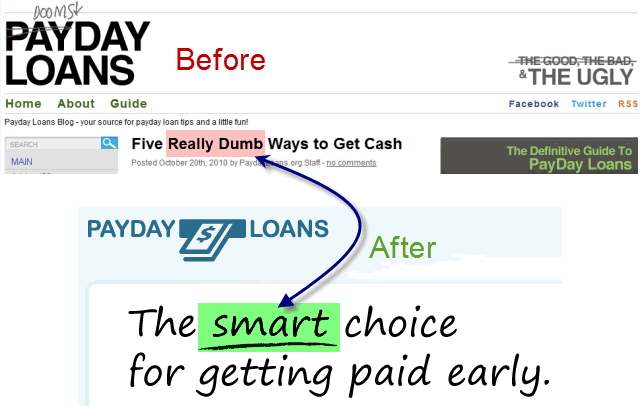
Now even he is now dumping many of his exact match domains, which I discovered in the most recent Media Options newsletter:
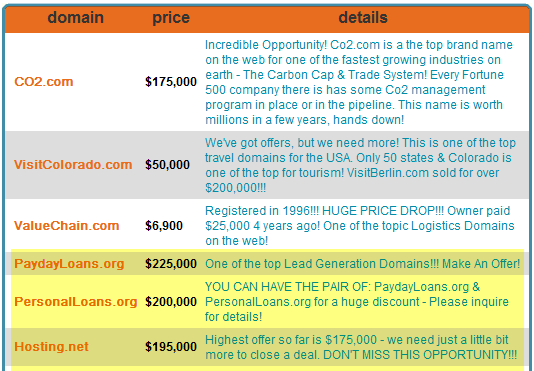
In March Matt Cutts talked down exact match domain names, but the truth is that Google never really needed to discount them, simply by adding more criteria to the relevancy algorithm which boosts brands they already had the same impact.
Search has moved away from relevancy toward promoting brands. As SEOs we don't control Google. We can only focus on promoting that which they reward.
The smart money is now saying that domain names are generally significantly overpriced, especially as an asset class valued based on SEO potential.
Where do you place your wager?
Update: On November 7th, 2016 PaydayLoans.net sold at NameJet for $3,005 & PaydayAdvance.net sold for $189 ... huge drops from the hundred grand to quarter million or so ask on some of the above shared names.
And those are 2 of the biggest terms in the payday industry
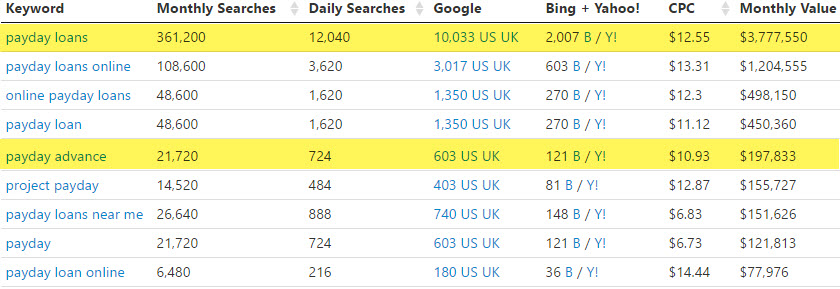
Why such a huge drop in the price of the domains? All the reasons stated in the above post. Oh, and, Google is allowing their investment in payday loans to get away with using bulk doorway pages.


